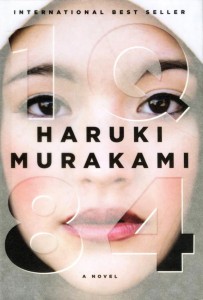 Murakami’s newest book series disappoints.
Murakami’s newest book series disappoints.
If you haven’t heard of or read anything by Haruki Murakami, you should. But if you’re going to pick up one of his novels, don’t start with his newest work, 1Q84. The three-volume novel, while worth a read, is not entirely representative of Murakami’s genius.
The Japanese author’s work is generally spontaneous, humorous, and echoes the literary voices of Vonnegut, Kafka, and Kerouac. It bears a strange, dreamlike quality, and features elements of the supernatural and surreal. Yet, despite Murakami’s metaphysical themes and almost science fiction style, his writing is also fundamentally realistic, which is what gives his novels their particular allure. Amid his imagined worlds filled with subtle magic and unreal atmospheres, he always gives his readers something relatable that they can hold on to. Much of his work centres on human themes of alienation, loneliness, and a lost sense of purpose. His readers are somehow not distracted or confused by his use of the otherworldly elements, and they read his novels as though they are following one of their own dreams. When you start a Murakami novel, go into it with the expectation that you will be disoriented, but expect to find yourself wholly immersed in his amusing, bizarre, and captivating universes.
And although I urge you with all of my heart to pick up one of Murakami’s books, the first one you read should not be 1Q84. The story is a drawn out half-mystery, half-love story that revolves around two central characters: Tengo, a schoolteacher and ghostwriter, and Aomame, a fitness instructor turned assassin hired to kill abusive men. Each character has a secret double life that leads them both, inadvertently, into an alternative universe called 1Q84. The parallel world is recognizable through the presence of two moons, and is built upon the existence of strange, undefined creatures called ‘Little People’, and their connection with a cult called Sakigake.
I went through the entire novel (almost 1000 pages) trying to figure out who the Little People are, what they do, how Tengo and Aomame are connected, what 1Q84 is, and whether the book that Tengo writes with seventeen-year-old Fuka-Eri is fact or fiction. Many of these questions are eventually answered, but the book ends, somewhat anticlimactically, with many plot holes and unresolved queries.
While Murakami’s brilliant, and accessible prose keeps the book engaging, the story line is so drawn out that readers may lose interest. For such a suspenseful plot on paper, Murakami did not have me hanging on every page, dying to get the next volume of the book to see how things were resolved. Perhaps this is my previous devotion to Murakami speaking, but despite the book’s admittedly slow pace, I still consider it to be a worthwhile read. It is filled with beautiful moments, enviable style and language, and significant themes. The book explores the idea of a modern utopia as it introduces the Sakigate cult, questions the methods used to promote feminism as Aomame murders abusive men, and mediates on the existence of our own double lives. The story is so complex and readers are left with much to think about long after the story’s conclusion, but the hard part about reading this series is committing to the book long enough to actually finish it.





